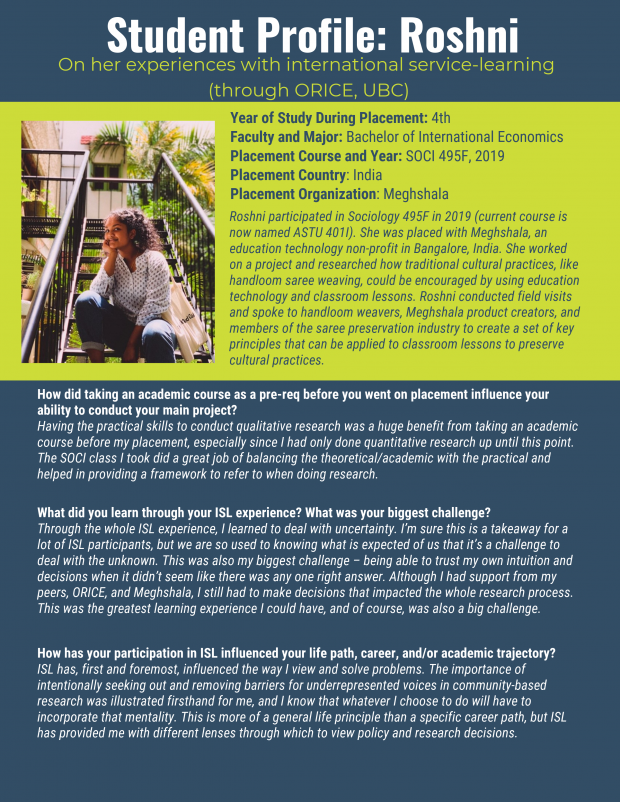The purpose of this page is to share brief snapshots of EL as it happens across UBC faculties, departments, and units. This not an exhaustive list, but rather an illustration of how EL is approached and practiced across UBC.
Experiential learning takes richly diverse forms across UBC, sometimes to the extent that it’s difficult to imagine everything fitting under one umbrella called “Experiential Learning.” I have found the vastly different ways that faculties approach EL to be one of UBC’s great strengths. The key, as I see it, is in discovering a common language that we might use to talk about the complexities and similarities.
Why does EL look so different across UBC?
The tremendous variety of EL can be attributed to many factors including:Specificities of the field or discipline
- Student desires, resources, time
- Faculty member desires, resources, expertise, time
- Faculty / Department leadership, support, and commitment to EL
- Traditional forms of teaching and learning in given disciplines
- Professional accreditation requirements
- Systemic considerations and context-specific barriers (e.g. budget, class size, location, differences in privilege and power)
Faculty of Applied Science
Faculty of Arts
As the largest and most diverse Faculty at UBC, Arts provides its students with a wide range of opportunities for experiential learning across the Social Sciences, Humanities, and the Creative and Performing Arts at the undergraduate and graduate levels. In several disciplines experiential learning activities are required for graduation.
Among the most prominent forms of experiential learning in Arts are:
- Service Learning, both curricular and co-curricular, domestic and international
- Co-operative Education (at undergraduate and graduate levels)
- Field Schools
- Study Abroad and International Group Study Programs
- Research intensive experiences, including labs and internships, both domestic and international
- Professional practicums
- Performance, theatre and film production, production of creative artifacts
- Case studies integrated within courses
- Design challenges
- Student directed seminars
- Entrepreneurship
Sauder School of Business
The Sauder School of Business provides its students with myriad opportunities for experiential learning. Among the most prominent forms of learning in Sauder are:
- Internships (MBA program - Learn about their Summer Experiential Learning component here)
- Entrepreneurial Projects, social entrepreneurship
- Global Immersion
- Co-ops (Bachelor of Commerce Program - Learn about other Undergraduate Experiential Learning opportunities here)
- Competitions and Conferences (Read this Globe and Mail article about an International Case Competition hosted by Sauder in partnership with BC's Kanaka Bar Indian Band)
Faculty of Dentistry
Text here
Faculty of Education
Text here
Extended Learning
Text here
Faculty of Forestry
The Faculty of Forestry sees experiential learning as central to its ability to educate forestry students. Some Quick Facts:
- Some prominent forms of EL that exist in Forestry are: Co-op, Field Schools, and Capstone courses.
- About 50% of Forestry graduates will have participated in a co-op during their degree
- In the June 2018 Forestry Faculty Meeting, faculty members identified experiential learning as their top strength
- UBC Forestry has two Research Forests in British Columbia, which are UBC-owned forested land where faculty members and students can go to learn and conduct research. Both Research Forests are home to camps, education centres, and long-term research projects.
- 191 Forestry students did four-month placement co-ops during 2017/18 academic year
- EL Course Examples:
- WOOD 353: Mill Site Visits is a one-week course that entails a tour of wood products manufacturing operations in the Interior of British Columbia. Students travel by tour bus as far north as Prince George or Quesnel and then work their way back towards Vancouver visiting a wide range of mills.
- WOOD 305: Wood Machining Skills is held in the machine lab and provides students the opportunity to design, plan, and manufacture their own piece of wooden furniture while practicing safety procedures and supervisory skills.
- CONS 451: For an entire semester, students tour British Columbia to camp in and learn about 3 distinct ecosystems.
- Greatest challenges to EL in Forestry:
- The exponential expansion of the program has made experiential learning more difficult to achieve with the same level of quality and degree of depth as before
- Info on Forestry Field Schools
Graduate and Postdoctoral Studies
Text here
Faculty of Land and Food Systems
Text here
Peter A. Allard School of Law
Text here
Faculty of Medicine
Text here
Faculty of Pharmaceutical Sciences
The Office of Experiential Education (OEE) facilitates all the experiential learning that Pharm Sci students engage in during their program at UBC. Some Quick Facts:
- The most dominant forms of experiential education in PharmSci are:
- Practicums
- Service-learning
- One-time community outreach projects
- Experiential Education comprises 25% of the curriculum for the Pharm D (Doctor of Pharmacy) Program
- Each year, the OEE facilitates over 1500 student placements for Pharm Sci students through either practicums or service-learning placements
- In 2018, the Pharm D program doubled the required time for experiential education placements; Whereas PharmD students previously did 20 weeks of experiential education over the course of their 4-year doctorate, they are now required to do 42 weeks.
- EL Examples in Pharm D:
- Practicums: All Pharm D students spend 42 weeks in practicum placements in hospitals, pharmacies, and community during their 4-year degree. A practice educator (aka - a preceptor, or practicing pharmacist) guides student learning within the pharmacy context where they are placed.
- Service-Learning: PHRM 270 is a required service-learning course for all PharmD students during their second year. Students are paired up with community organizations in and around Vancouver, where they spend a total of 20 hours learning about social determinants of health and the lived realities of different communities.
- Who to call: Any of the team members listed on this website can direct your questions accordingly.
Faculty of Science
Text here
UBC Vantage College
Text here
